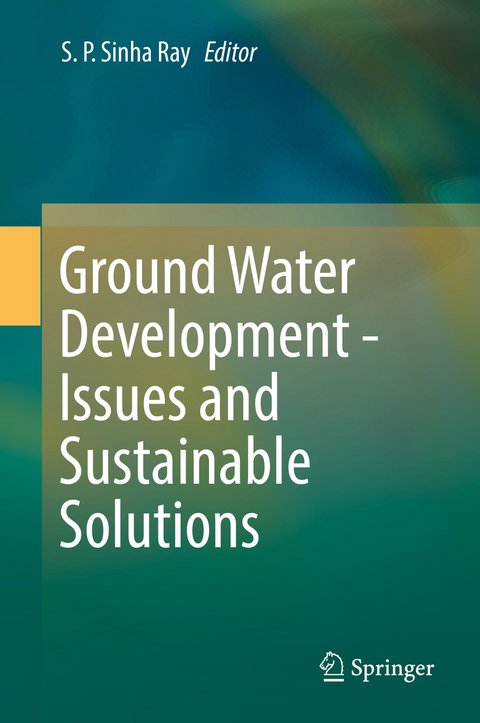
Ground Water Development - Issues and Sustainable Solutions
Springer Verlag, Singapore
978-981-13-1770-5 (ISBN)
There is pressing need to evolve workable methods and approaches based on modern scientific researches on ground water resources, as well as to build a social framework including community participation at all levels for a ground water development system. The community participation in water pumping policies, incentives of efficient use, affordability of low income users and other vulnerable groups, water awareness are prime factors for success of any ground water based water supply project.
S. P. Sinha Ray has been a member of Central Ground Water Board and Central Ground Water Authority, Ministry of Water Resources, Government of India. He has more than 40 years of experience in groundwater exploration, development and management. By virtue of his long association with the country’s apex organization dealing with groundwater resources, he has acquired substantial expertise in the field. Besides having a vast knowledge of the subject within the country, he has also gained insights and know-how in other countries like Algeria, Bangladesh, the USA, Korea, Zimbabwe and Japan. He is a Fellow of West Bengal Academy of Science, a Member, International Association of Hydrogeologists and Emeritus President, Centre for Ground Water Studies, Kolkata.
Major Ground Water Development Issues in South Asia- An Overview.- Part I. Groundwater Development Problems in Arid and Semi-Arid & Hilly Areas.- Water Management in Arid and Semi- Arid Areas of India.- Frontiers of Hardrock Hydrogeology in India.- Characterisation of a Deep Saline Aquifer Using Oil Exploration Data in an Arid Region of Rajasthan, India.- Sustainable Management of Groundwater in Hard Rock Aquifers of South Andaman and Rutland Islands, India.- Part II. Ground Water Management in Alluvial and Coastal Areas.- Groundwater Management in Alluvial, Coastal and Hilly Areas.- Findings of Large Ground Water Development Potential in Deeper Aquifers in Karnafully – Feni Interfluves, Chittagong, Bangladesh—A New Scientific Initiative.- Sustainable Water Resource Management in the Indian Sundarbans Delta.- Part III. Conservation of Ground Water.- Conservation of Water: Artificial Recharge to Groundwater.- Interrelationship Between Surface and Groundwater: The Case of West Bengal.- Integrated Watershed Management and Ground Water Recharging – Initiatives of Centre for Ground Water Studies – A Public Private Partnership Endeavour.- Part IV. Advance Research in Ground Water.- Application of Modern Geophysical Techniques for Identification of Groundwater Potential Areas.- Role of Remote Sensing and GIS in Integrated Water Resources Management.- Modeling of Aquifer System: A Tool for Groundwater Management.- Application of Environmental Isotopes in Hydrological Investigation with Case Studies.- Part V. Contaminated Ground Water & its Mitigation.- Arsenic and Fluoride Contamination in Groundwater: Mitigation Strategies.- Community-based Defluoridation of Groundwater by Electrocoagulation Followed by Activated Alumina Adsorption.- Variation of arsenic accumulation in paddy plant with special reference to rice grain and its additional entry during post harvesting technology.- Human Health Hazards due to Arsenic and Fluoride Contamination in Drinking Water and Food Chain.- Arsenic Menace in West Bengal (India) and its Mitigation through Toolbox intervention – An experience to share.- Part VI. Climate Change and its Impact in Ground Water.- Impact of Climate Change on Groundwater System.- Part VII. Community Involvement & Participatory Management.- Participatory groundwater management in the flood plains of north Bihar: Preliminary results of arsenic distribution.- Spring Protection and Management: Examples from Recent Programmes from across India’s Mountainous Regions.- Part VIII. Ground Water Development Issues & Sustainable Solutions.- Ground Water Development Issues & Sustainable Solutions.
| Erscheinungsdatum | 29.11.2018 |
|---|---|
| Zusatzinfo | 92 Illustrations, color; 66 Illustrations, black and white; XXVII, 349 p. 158 illus., 92 illus. in color. |
| Verlagsort | Singapore |
| Sprache | englisch |
| Maße | 155 x 235 mm |
| Themenwelt | Naturwissenschaften ► Biologie ► Ökologie / Naturschutz |
| Naturwissenschaften ► Geowissenschaften ► Hydrologie / Ozeanografie | |
| Technik ► Umwelttechnik / Biotechnologie | |
| ISBN-10 | 981-13-1770-4 / 9811317704 |
| ISBN-13 | 978-981-13-1770-5 / 9789811317705 |
| Zustand | Neuware |
| Haben Sie eine Frage zum Produkt? |
aus dem Bereich


